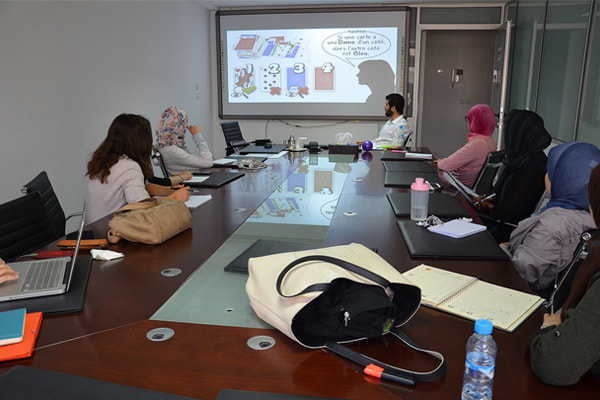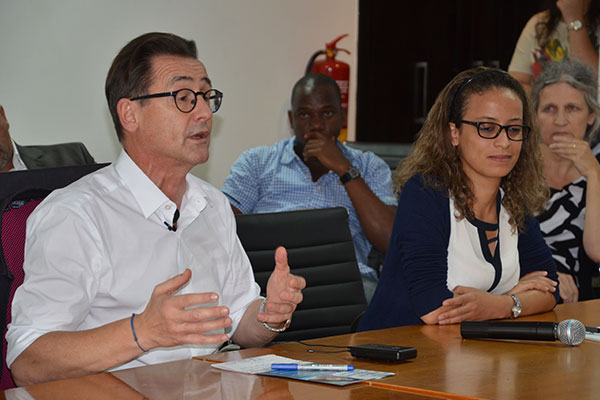MISSION OF THE DEPARTMENT OF PSYCHOMOTRICITY
The department is entrusted with the realization of the mission of the College of Health Sciences in the domain of psychomotricity. Therefore, the department strives to generate, disseminate and apply knowledge pertaining to prevention of disease, promotion of health, elimination of health disparities and improving health system performance.
The mission is to train quality psychomotor therapists, carry out creative, innovative and inventive psychomotricity research, provide community psychomotor services, set and practice international standards in evidence based psychomotricity and be at the fore front of development and policy formulation.
The vision for the Department is to become the center of excellence in psychomotricity education, research and community service in Morocco with high class scholars and professionals committed to maintenance of high quality standards of the psychomotricity profession in line with global trends.
To achieve this vision, the Institute works to become:
The mission is to train quality psychomotor therapists, carry out creative, innovative and inventive psychomotricity research, provide community psychomotor services, set and practice international standards in evidence based psychomotricity and be at the fore front of development and policy formulation.
The vision for the Department is to become the center of excellence in psychomotricity education, research and community service in Morocco with high class scholars and professionals committed to maintenance of high quality standards of the psychomotricity profession in line with global trends.
To achieve this vision, the Institute works to become:
- The largest institution for psychomotor therapists’ education in Morocco in terms of enrolment and degree programs.
- The leading research institution in psychomotricity in Morocco in terms of volume and quality of research, partnerships in research and publication in peer reviewed journals.
- The leading institution in Morocco in advocacy for community-oriented psychomotricity as indicated by participation in national and global public health forums, networks and alliances.
- The leading consulting think tank of the nation in the field of psychomotricity.
ACADEMIC PROGRAMS
ABOUT THE DEPARTMENT

Our department educates and graduates world class psychomotor therapists who are capable to help children and adults with psychomotor problems.
These problems represent all the body’s and motricity’s "disorders" which take a prominent place in the psychic and relational functioning in their origin or in their evolution. They manifest in the way the person engages itself into the action and the relationship with others and in the world around him.
Our department educates and graduates world class psychomotor therapists who are capable to help children and adults with psychomotor problems. These problems represent all the body’s and motricity’s "disorders" which take a prominent place in the psychic and relational functioning in their origin or in their evolution. They manifest in the way the person engages itself into the action and the relationship with others and in the world around him.
Psychomotor disorders are most often at the junction of multiple factors affecting the neurophysiological development, psychic structure and the person's history. They are often situational and soft, mainly hindering coping mechanisms then constituting a source of inconvenience and of suffering to the wearer.
These disorders include cognitive disorders, ADHD, relationship’s and communication disorders, developmental coordination disorders, balance disorders, body’s schemes or body’s image’s disorders, muscle’s tone disorders, graphic and lateral dominance’s disorders and spatial and temporal organization’s disorders.
We offer undergraduate and graduate programs in psychomotricity. The 3-year undergraduate program prepares graduates for entry-level practice as psychomotor therapists. The graduate program qualifies students for advanced psychomotricity practice in as specialists. Both programs are designed in full compliance with the higher education norms and standards in the European Union and North America.
We also work hard to implement the college strategy for research. The ambition of this strategy is to place our department at the national forefront of epidemiological and clinical psychomotricity research. The strategy focuses on four priorities:
Please feel free to contact us for further information and we are looking forward to welcoming you to the college soon.
These problems represent all the body’s and motricity’s "disorders" which take a prominent place in the psychic and relational functioning in their origin or in their evolution. They manifest in the way the person engages itself into the action and the relationship with others and in the world around him.
Our department educates and graduates world class psychomotor therapists who are capable to help children and adults with psychomotor problems. These problems represent all the body’s and motricity’s "disorders" which take a prominent place in the psychic and relational functioning in their origin or in their evolution. They manifest in the way the person engages itself into the action and the relationship with others and in the world around him.
Psychomotor disorders are most often at the junction of multiple factors affecting the neurophysiological development, psychic structure and the person's history. They are often situational and soft, mainly hindering coping mechanisms then constituting a source of inconvenience and of suffering to the wearer.
These disorders include cognitive disorders, ADHD, relationship’s and communication disorders, developmental coordination disorders, balance disorders, body’s schemes or body’s image’s disorders, muscle’s tone disorders, graphic and lateral dominance’s disorders and spatial and temporal organization’s disorders.
We offer undergraduate and graduate programs in psychomotricity. The 3-year undergraduate program prepares graduates for entry-level practice as psychomotor therapists. The graduate program qualifies students for advanced psychomotricity practice in as specialists. Both programs are designed in full compliance with the higher education norms and standards in the European Union and North America.
We also work hard to implement the college strategy for research. The ambition of this strategy is to place our department at the national forefront of epidemiological and clinical psychomotricity research. The strategy focuses on four priorities:
- Development of standardized diagnostic tools adapted to the Moroccan culture that can be used in research and practice;
- Development of culturally responsive novel delivery models of psychomotor therapies;
- Amelioration of the impact of psychomotor therapies for ADHD;
- Psychomotor therapies of learning disabilities; and
- Exploring the potentials of psychomotricity for the geriatric population.
Please feel free to contact us for further information and we are looking forward to welcoming you to the college soon.
WHAT IS PSYCHOMOTRICITY AND WHY IT MATTERS?

As a psychotherapy focused on body mediation, psychomotricity places a special emphasis on the interrelationship between motor functions and the psychic life of the individual. It is based on a holistic view of the human being, churching the unity of body and mind and integrating the person’s cognitive, emotional, and physical dimensions.
Psychomotricity derives, therefore, scientific concepts and methods from a variety of disciplines such as neurology, psychology, occupational therapy, physical education and rehabilitation.
As a psychotherapy focused on body mediation, psychomotricity places a special emphasis on the interrelationship between motor functions and the psychic life of the individual. It is based on a holistic view of the human being, churching the unity of body and mind and integrating the person’s cognitive, emotional, and physical dimensions. Psychomotricity derives, therefore, scientific concepts and methods from a variety of disciplines such as neurology, psychology, occupational therapy, physical education and rehabilitation.
Dozens of techniques do exist in the therapeutic arsenal of psychomotricity. They can be categorized in three main categories:
Psychomotor therapists provide indispensable services for patients and clients with the following problems:
Psychomotricity derives, therefore, scientific concepts and methods from a variety of disciplines such as neurology, psychology, occupational therapy, physical education and rehabilitation.
As a psychotherapy focused on body mediation, psychomotricity places a special emphasis on the interrelationship between motor functions and the psychic life of the individual. It is based on a holistic view of the human being, churching the unity of body and mind and integrating the person’s cognitive, emotional, and physical dimensions. Psychomotricity derives, therefore, scientific concepts and methods from a variety of disciplines such as neurology, psychology, occupational therapy, physical education and rehabilitation.
Dozens of techniques do exist in the therapeutic arsenal of psychomotricity. They can be categorized in three main categories:
- Therapies that are largely based on corporal mediation techniques
- Therapies that are largely psycho-sensory techniques
- Therapies that are largely based on expressive techniques
Psychomotor therapists provide indispensable services for patients and clients with the following problems:
- Premature babies : Preterm is defined as babies born alive before 37 weeks of pregnancy are completed. A considerable proportion of these babies suffers from psychomotor complications warranting psychomotor therapy.
- Cerebral palsy: a condition marked by impaired muscle coordination (spastic paralysis) and/or other disabilities, typically caused by damage to the brain before or at birth.
- Language or speech delays: This includes the ability to communicate with other people effectively, express and receive information such as instructions on how to complete an assignment, and to form sentences.
- Motor delays: This includes the ability to balance, walk, and use your hands and fingers, and hand-eye coordination.
- Social and emotional delays: This includes the ability to have meaningful relationships with others, interact with others, and being able to pick up on social cues.
- Cognitive delays: This category includes thinking skills, learning, reasoning, and memory. Symptoms of cognitive delays include:
- Psychomotor retardation: a generalized slowing of psychological and physical activity, frequently occurring as a symptom of severe depression.
- Psychomotor agitation: a series of unintentional and purposeless motions that stem from mental tension and anxiety of an individual. This includes pacing around a room, wringing one's hands, uncontrolled tongue movement, pulling off clothing and putting it back on and other similar actions.
- ADHD: a chronic condition marked by persistent inattention, hyperactivity, and sometimes impulsivity. ADHD begins in childhood and often lasts into adulthood.
- Autism: a mental condition, present from early childhood, characterized by difficulty in communicating and forming relationships with other people and in using language and abstract concepts.
- Learning disability: a condition giving rise to difficulties in acquiring knowledge and skills to the level expected of those of the same age, especially when not associated with a physical handicap.
- Oppositional defiant disorder: a condition in which a child displays an ongoing pattern of uncooperative, defiant, hostile, and annoying behavior toward people in authority. The child's behavior often disrupts the child's normal daily activities, including activities within the family and at school.
- Eating disorders: a range of psychological disorders characterized by abnormal or disturbed eating habits (such as anorexia nervosa).
- Anxiety disorders: a category of mental disorders characterized by feelings of anxiety and fear, where anxiety is a worry about future events and fear is a reaction to current events. These feelings may cause physical symptoms, such as a racing heart and shakiness.
- Depressive disorders: persistent feelings of sadness and worthlessness and a lack of desire to engage in formerly pleasurable activities.
- Alzheimer's disease: a progressive, degenerative disorder that attacks the brain's nerve cells, or neurons, resulting in loss of memory, thinking and language skills, and behavioral changes.
- Parkinson’s disease: a progressive disease of the nervous system marked by tremor, muscular rigidity, and slow, imprecise movement, chiefly affecting middle-aged and elderly people.
COLLEGE OF HEALTH SCIENCESAuthorized by the Ministry of Higher Education, Scientific Research and Professional Training (Authorization No. 434/2015)
Member of the Association of Schools of Public Health in the European Region (ASPHER) Partner of the City University of New York (CUNY) 14, Boulevard de Paris, 20000 Casablanca, Morocco Tel.: 0522475775 | Fax: 0522 475778 | Email: info@esss.ac.ma |


